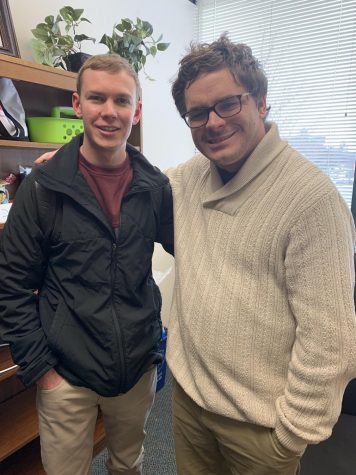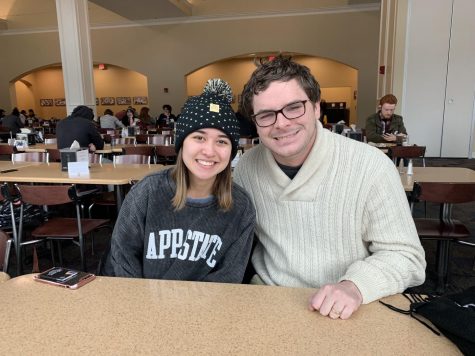CPR-trained students help save Rev. Rob Lee during seizure Monday
When freshman communication major Taylor Masten’s class was dismissed 10 minutes early on Jan. 28, she had no idea she would help save a life two minutes later.
Rev. Rob Lee, a lecturer in the communication department, was meeting with one of his interns at Espresso News on Howard Street when he started having trouble breathing. He left the coffee shop to get an emergency inhaler from his office in Walker Hall. Lee said he assumed he was having an asthma attack until he crossed Rivers Street.
“I knew I wasn’t breathing. I knew I was going down. I was trying to yell for help, but I didn’t even know if those words were coming out,” Lee said.
Masten heard Lee’s cry for help and turned to see him stumbling before falling face-first in the grass beside Walker Hall. She and her classmate ran over to Lee, and Masten realized he was having a seizure. As more people came to the scene, a group flipped Lee onto his side, but soon realized he was unconscious and not breathing.
“I called 911 at 10:42 (a.m.). We had been out there for two minutes,” Masten said. “As soon as I thought in my head that we needed to start CPR, some random student ran up to us. He had been walking in that area and told us that he was a student EMT.”
The student was Joey Martin, senior exercise science major. Martin and Phylissa Greeley, a senior exercise science major, immediately felt for a pulse and began two rescuer CPR. After several minutes, Lee regained consciousness and App State police officers arrived as first responders. Martin said the ambulance arrived about a minute after the police.

Lee later told Martin that his doctor said without the CPR, he would have had brain damage or have died because he was not receiving oxygen to the brain. Martin learned CPR in Emergency Care and CPR, a public health course. Greeley said she learned CPR during the summer to become a Certified Registered Nurse.
“This is something that no one ever wants to have happen to them, but these things do happen,” Martin said. “Crisis management is something that I feel is ignored because it’s one of the subjects that no one wants to talk about.”
Martin was surprised when he got to the scene that not one of the 20 people surrounding Lee knew how to do CPR.
“I think that’s why my teacher told me it’s better to have 20 people that are certified and know what they are doing than for 20 people to expect one person to know how to do it,” Martin said.
Fifty-four percent of people in the U.S. know how to perform CPR, according to the 2017 Cleveland Clinic heart health survey. Greeley said she learned CPR in just one day through her CRN course and thought high school students should take a day to gain certification.
Lee said after he tweeted about receiving CPR on Tuesday, several people responded saying they scheduled CPR training at their workplaces.
Lee met with Martin and Masten on Tuesday to thank them for saving his life. Martin said he wanted to continue working with Lee to make sure App State was a place where a roomful of people would know how to administer CPR and understand how to handle a crisis. One of his goals is to find a community member to sponsor a CPR certification class.

“Even if only 100 people did the class, it’s 100 people that are now certified and might be able to step up in a situation like that,” Martin said.
Lee is well-known as a descendant of Robert E. Lee and for denouncing Confederate monuments.
“I’m in the church and with what I do with racism and anti-racism training, all life is precious,” Lee said. “I have a deeper empathy about what’s on the line for so many people that are risking so much every day just by the virtue of who they are.”
Lee said he is preparing for a tour for his book “A Sin By Any Other Name,” which grapples with racism and Southern heritage. He said he wants to use the story of his seizure to tell people about the importance of life. Lee is undergoing testing to understand the cause and prevent further medical issues because this was his first seizure.
“I’m really going to take time to make sure I’m well before I come back to campus,” Lee said. “But I know I can’t wait to be back in the classroom.”
We hope you appreciate this article! Before you move on, our student staff wanted to ask if you would consider supporting The Appalachian's award-winning journalism.
We receive funding from the university, which helps us to compensate our students for the work they do for The Appalachian. However, the bulk of our operational expenses — from printing and website hosting to training and entering our work into competitions — is dependent upon advertising revenue and donations. We cannot exist without the financial and educational support of our fellow departments on campus, our local and regional businesses, and donations of money and time from alumni, parents, subscribers and friends.
Our journalism is produced to serve the public interest, both on campus and within the community. From anywhere in the world, readers can access our paywall-free journalism, through our website, through our email newsletter, and through our social media channels. Our supporters help to keep us editorially independent, user-friendly, and accessible to everyone.
If you can, please consider supporting us with a financial gift from $10. We appreciate your consideration and support of student journalism at Appalachian State University. If you prefer to make a tax-deductible donation, or if you would prefer to make a recurring monthly gift, please give to The Appalachian Student News Fund through the university here: https://www.givecampus.com/campaigns/54088/donations/new?designation_id=faa93386&
